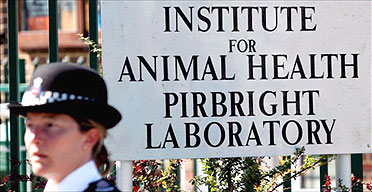
A worker at the government research facility in Pirbright that is at the centre of the foot and mouth outbreak has contracted legionnaires' disease, with officials saying the lab is a possible source of contamination, Guardian Unlimited can reveal.
The Health Protection Agency confirmed there had been a reported case of legionnaires' disease "with alleged links to the Institute of Animal Health at Pirbright, in Surrey".
Environmental health inspectors took water samples from the facility today. At this stage, it is unclear whether the IAH employee contracted legionnaires' disease at the lab.
"Everywhere the patient has been in the 10-14 days before falling ill, including their home, place of work and anywhere they may have travelled to or visited, is assessed to establish whether there is any potential source of infection which may need further investigation and/or testing," a Health Protection Agency statement said.
"Early findings covered ... management systems and documentation relating to the [Pirbright] building, in which the individual had been working.
"These findings, backed up by temperature monitoring in the same area, suggested that the institute was carrying out all necessary maintenance and monitoring work in compliance with the approved code of practice for the control of legionella."
The HSE said a joint investigation into the legionnaires' outbreak, carried out with the HPA, was launched two weeks ago.
"The team went in two weeks ago," an HSE spokeswoman said. "The investigation is ongoing, but it appears [the IAH] were doing everything they should to comply with the regulations to control the legionella bacterium. There wasn't anything out of the ordinary found."
However, the spokeswoman added that the government laboratory could not be given the all clear until the HPA had completed its investigation.
Mike Catchpole, the deputy director of the HPA, said: "There is no evidence of a link between this [the legionnaires' case] and foot and mouth disease."
Speaking to BBC News 24, he said: "My understanding is that it [Pirbright] does not test for or work with this organism [legionella bacteria]."
He said the individual involved contracted the disease in late June and had "got over the initial illness".
Dr Keith Jones, an environmental microbiologist from Lancaster University, said he would be "very surprised" if the worker had contracted legionnaires' disease at Pirbright.
"If there was something wrong you would have expected a lot more than one person to be infected. You would have thought that an institute involved in biosecurity like this would have first rate systems for water, air and disinfectant treatment," he said.
Legionnaires' disease is a potentially fatal form of pneumonia, with its symptoms - similar to those of flu - including fever, headaches, chills and tiredness.
There are typically around 300 to 350 cases in England each year. There was a record number of cases in England and Wales in the first half of this year - 163 between January and June, compared to 120 during the same period last year - which has prompted an investigation by the Health Protection Agency. The peak period for the disease is between August and October.
On Tuesday, an interim report by the Health and Safety Executive on Tuesday said employees either from the IAH or the private firm Merial - which shares the Pirbright site - had somehow spread the foot and mouth virus which has infected two herds in the local area.
There has been intense scrutiny of the two Pirbright facilities and the suspected failure of biosecurity.
It is the latest health scare to hit the IAH. Last year, the HSE told another IAH laboratory, in Compton, Berkshire, that it had failed to protect staff and visitors from "substances hazardous to health", including the legionnaires' disease bacteria.
Serious flaws were discovered in the ventilation system at Compton. The health and safety inspector who reported concerns at that laboroatory is conducting the investigations at Pirbright, the Newbury Today newspaper reported.
This week, the HSE report into the foot and mouth outbreak found the air filters at Pirbright were regularly checked.
Geoffery Podger, the HSE chief executive, said the chances of the foot and mouth virus being released from the site through the ventilation system were "negligible".
The interim report has been criticised as "bland and inconclusive".
It said both labs were working on the strain of the disease involved in the farm outbreak, although Merial was producing it in large quantities while the IAH was using only small amounts. The two labs have insisted their biosecurity is sound.
There have so far been two confirmed cases of foot and mouth at farms close to Pirbright, and the precautionary culling of animals has been ordered at a third farm.
Lawyers for farmers and related businesses are examining whether there is a case for suing either the government or Merial over loss of earnings.

